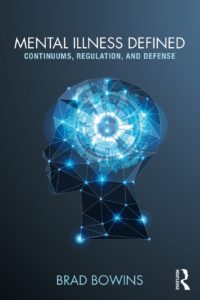
MENTAL ILLNESS DEFINED: CONTINUUMS, REGULATION, AND DEFENSE
Accurately defining mental illness is crucial for treatment providers and researchers, because it fosters a comprehensive understanding and optimizes therapeutic interventions. In addition, it frees psychopathology from political and financial influences that weaken its scientific integrity.
In combination, continuums, regulation, and defense, robustly define mental illness.
Continuums: Psychopathology embodied by major diagnostic systems (DSM and ICD) emphasizes discrete conditions, in line with our psychological preference for discreteness. However, nature almost universally gravitates to continuums. Naturally occurring mental illness continuums are identified, based on neuroscience and other relevant data.
Regulation: Despite how biological systems rely on regulation, it is largely neglected when it comes to mental illness. Psychopathology frequently arises from impaired regulation, fostering a shift from milder expressions on continuums to extreme manifestations. A diverse collection of therapeutic techniques, under the umbrella of cognitive regulatory control therapies, is presented that restore effective regulation.
Defense: The surprising role of psychological defense, understood in terms of compensation for stressors, is described for the various mental illness continuums, and techniques are provided to augment healthy defensive functioning.
The model of psychopathology proposed aligns with its natural organization, thereby placing mental illness on a more scientific foundation.
Mental Illness Defined: Continuums, Regulation, And Defense YouTube
REVIEWS
Eric R. Marcus, MD, director, Columbia University Center for Psychoanalytic Training and Research; professor of clinical psychiatry, Columbia University College of Physicians and Surgeons
“This book describes the dimensional applied to psychiatric diagnosis and stirs the discussion at just the right time. The DSM system of rigid categories for psychiatric diagnosis is increasingly called into question. Categorical vs dimensional; we need to have this discussion. Bowins allows us the ability to think about the topic in the sophisticated way it demands!”
Barbara Klein, PhD, ED, author, Alone in the Mirror: Twins in Therapy
“Mental Illness Defined is a thought-provoking and meaningful book. Dr. Bowins presents a sophisticated and innovative approach to understanding and integrating contemporary psychoanalytic theory with the latest cognitive behavioral theory and neuroscience. This combination of theories is presented on a continuum and provides a coherent and cohesive way of looking at the practice and necessary research in mental health in today’s world. This approach is positive, individualistic, and open-ended in a dogmatic and rigid atmosphere that prescribes discrete sophomoric categories for emotional deregulation.”
Edward Shorter, PhD FRSC, Jason A Hannah Professor of the History of Medicine, professor of psychiatry, faculty of medicine, University of Toronto
“As a scientific classification of psychiatric illness, the current DSM has evoked widespread dissatisfaction. Clearly, alternative schemes of illness classification are needed. Here Dr. Bowins throws into the mix the concepts of continuum, regulation and defense: many disorders acting in reciprocal relationship to one another in order to maintain balance in the organism. The analysis is strikingly original, based on a command of the enormous literature, and is an essential contribution to the coming debate.”
Negative Symptom sample chapter
Negative Symptom Sample Chapter from Mental Illness Defined
